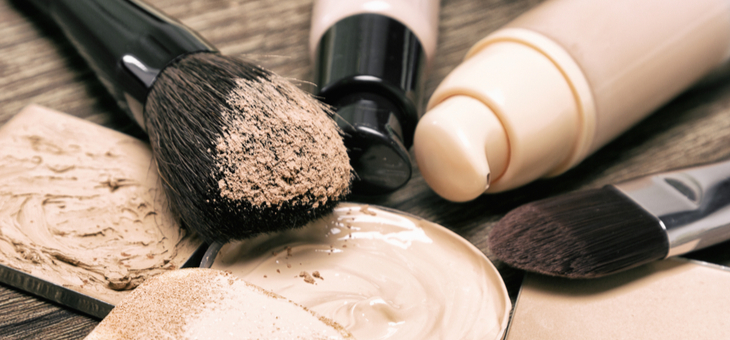Your make-up touches some of the most sensitive parts of your body, including your lips, eyes and skin. While you may notice dirt, dead skin and old foundation cake your make-up brushes between washes, you can’t see the grime and bacteria that grow inside the products themselves.
Sanitising your make-up is something you should consider as part of your beauty and skincare routine, and it’s simpler than you might think.
How to avoid contamination
Use clean brushes
The need to sanitise and regularly clean make-up brushes is now widely known. The irony that some people practise loving, time-consuming skincare routines only to hammer their skin with a dirty, bacteria hoarding brush never fails to astonish.
Dermatologist Keira Barr said: “Your natural oils, bacteria, make-up, dead skin cells, dirt, and grime accumulate on the brush, and then you are reapplying that on a daily basis. This can lead to a lot of skin issues – acne, contact dermatitis, infections – but then from a functional aspect the brushes aren’t going to work.”
Titus Tse, co-founder of Coral UV, agreed. “A dirty make-up brush or sponge can contaminate your make-up (foundation, blush, etc). After dipping a bacteria-filled brush or sponge into your make-up, bacteria will grow in the make-up container, because of the dark, moist environment. This is not only bad for your skin, but it can decrease the quality of the make-up,” he warned Mind Body Green(MBG).
Don’t share make-up
“For goodness sake, do not share make-up, now or ever, but especially now!” warns Jenny Patinkin, celebrity make-up artist. You wouldn’t freely swap other intimate items that have regular contact with your skin with your friends, and make-up is no acceptation.
Keep make-up clean and uncontaminated
Your bathroom counter is likely exposed to a number of bacteria, dirt, moisture and steam. It’s best to keep your make-up away from the exposed countertop, and in a sealed, removed space. In some cases, it may be worth storing your make-up somewhere different, such as in a drawer in your bedroom.
“If you have a small bathroom that gets very steamy, move your make-up, brushes and sponges to a clean, dry place where they’re less likely to go through the humidity cycle and get mouldy,” warns Ms Patinkin.
How to sanitise your make-up
When it comes to tackling the tiny horrors hidden in your make-up, there are a few simple fixes. First, you’ll need isopropyl alcohol.
“I’m a purist. I like straight rubbing alcohol with no added ingredients or fragrances,” Ms Patinkin told MBG.
Powders
If you’re suspicious that a compact powder has been contaminated, you can scrape the top layer off. Alternatively, you can spray it lightly with alcohol, which will kill germs and evaporates quickly. But remember, most powders don’t contain water, meaning there is a low risk of growing bacteria.
Solids
When it comes to products such as pencils, stick blushes or highlighters or lipsticks, you can dip them directly into alcohol and allow them to fully dry. Alternatively, you could scrape or sharpen off the outer layer of the product and spray it with alcohol to kill any remaining bacteria.
Liquids
Water-based products can be breeding grounds for bacteria. Some products such as mascara require a brush to move between the container and your skin, transferring bacteria between them.
“With liquid make-up or mascara, you can add a small amount of rubbing alcohol directly into the container or onto your applicator, but be careful – if you use too much, it can change the texture of the product or irritate your skin or eyes,” said Ms Patinkin.
Be prepared to let go
Let’s face it, make-up isn’t cheap, and it’s not something many of us account for in the weekly budget, so letting go of a beloved, but near empty, product can be tough. But some products are ‘over the hill’ in terms of hygiene and bacterial growth.
If the product has begun to separate, has become discoloured or is past its expiry date – you can find this on the product’s label – it’s best to say goodbye. If your mascara or other liquid products have begun to smell bitter, it’s best they get the toss.
Do you sanitise your make-up? How frequently do you wash your brushes? Do you have any other tips or tricks about make-up hygiene to share with other YourLifeChoices readers?
If you enjoy our content, don’t keep it to yourself. Share our free eNews with your friends and encourage them to sign up.
Related articles:
https://www.yourlifechoices.com.au/lifestyle/stylewatch/tips-for-mature-makeup-application
https://www.yourlifechoices.com.au/health/your-health/deadly-bugs-in-your-makeup-kit
https://www.yourlifechoices.com.au/lifestyle/stylewatch/is-your-makeup-routine-summer-ready

